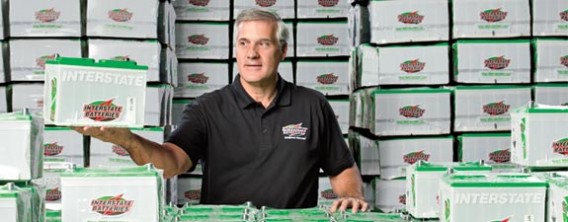
















It’s a rechargeable world. Between tablets, electric cars, and the ubiquity of cell phones, batteries threaten to supplant paper, oil, and copper wire. The worldwide market is expected to grow from $36 billion in 2008 to $51 billion by 2013—and nearly $10 billion in the United States alone.
Upstarts such as Better Place and BYD envision swapping gas stations for recharging ones. They have the technology but lack retail channels and distribution. And building your own is expensive. Better Place estimates doing so will cost $150 million per region. Which is why the linchpin of a rechargeable revolution may turn out to be a Dallas company with stronger ties to Nascar than green cars.
Interstate Batteries started selling its namesake product 60 years ago out of the back of its founder’s Studebaker truck. Today, the privately owned $1.4 billion company is America’s largest distributor of lead acid batteries (think: car), selling 15 million a year. It silently manages the private-label replacement batteries for 20 of the world’s 24 largest automakers, including Toyota. So while battery makers such as LG Chem, A123 Systems, NEC, and Johnson Controls are racing to perfect lithium-ion varieties, it will likely fall to Interstate to service, replace, and recycle most of them. (It already recycles more than a billion pounds of batteries annually.) “Right now, it’s a highly fragmented market,” says CEO Carlos Sepulveda, “but we’re everywhere.”
And coming soon to the strip mall near you. Interstate’s All Battery Centers promise “every battery for every need” and come close, with solutions ranging from iPads to yachts. Since acquiring the first stores more than a decade ago, Interstate has opened 153 additional stores, although Sepulveda says he could eventually add up to 1,000 across the country. (This year, he’ll open 40.)
As batteries become the common denominator of how we transport, express, and entertain ourselves, Sepulveda can see his chain staking a claim as the RadioShack of renewables. “If it’s solar panels, we can have relationships with manufacturers for parts, for warranties, and for servicing,” he says. “We can do the same thing for hybrid vehicles.” Interstate has talked to Toyota and other hybrid manufacturers about building a new distribution and recycling system. By planting its flag as the retailer of power, Interstate could fill the missing link between battery lab and living room or driveway. “Whichever way this market goes,” Sepulveda says, “we don’t have to fight it.”
A version of this article appears in the December / January issue of Fast Company.

» Folllow me on Twitter.
» Email me.
» See upcoming events.

Greg Lindsay is a generalist, urbanist, futurist, and speaker. He is a non-resident senior fellow of the Arizona State University Threatcasting Lab, a non-resident senior fellow of MIT’s Future Urban Collectives Lab, and a non-resident senior fellow of the Atlantic Council’s Scowcroft Strategy Initiative. He was the founding chief communications officer of Climate Alpha and remains a senior advisor. Previously, he was an urban tech fellow at Cornell Tech’s Jacobs Institute, where he explored the implications of AI and augmented reality at urban scale.

----- | January 22, 2024
The Future of Generative AI in Architecture, Engineering, and Construction
----- | January 1, 2024
----- | August 3, 2023
CityLab | June 12, 2023
Augmented Reality Is Coming for Cities
CityLab | April 25, 2023
The Line Is Blurring Between Remote Workers and Tourists
CityLab | December 7, 2021
The Dark Side of 15-Minute Grocery Delivery
Fast Company | June 2021
Why the Great Lakes need to be the center of our climate strategy
Fast Company | March 2020
How to design a smart city that’s built on empowerment–not corporate surveillance
URBAN-X | December 2019
CityLab | December 10, 2018
The State of Play: Connected Mobility in San Francisco, Boston, and Detroit
Harvard Business Review | September 24, 2018
Why Companies Are Creating Their Own Coworking Spaces
CityLab | July 2018
The State of Play: Connected Mobility + U.S. Cities
Medium | May 1, 2017
Fast Company | January 19, 2017
The Collaboration Software That’s Rejuvenating The Young Global Leaders Of Davos
The Guardian | January 13, 2017
What If Uber Kills Public Transport Instead of Cars
Backchannel | January 4, 2017
The Office of the Future Is… an Office
New Cities Foundation | October 2016
Now Arriving: A Connected Mobility Roadmap for Public Transport
Inc. | October 2016
Why Every Business Should Start in a Co-Working Space
Popular Mechanics | May 11, 2016
Can the World’s Worst Traffic Problem Be Solved?
The New Republic | January/February 2016

January 31, 2024
Unfrozen: Domo Arigatou, “Mike 2.0”
January 22, 2024
The Future of Generative AI in Architecture, Engineering, and Construction
January 18, 2024
The Promise and Perils of the Augmented City
January 13, 2024